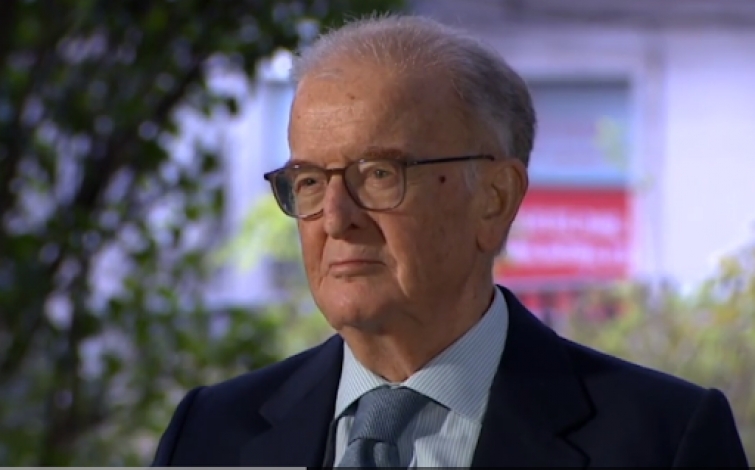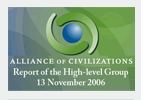JORGE SAMPAIO (1939-2021)
September 10, 2021
Nota sobre o falecimento do Presidente Jorge Sampaio
É com o mais profundo pesar que o gabinete do Presidente Jorge Sampaio tomou conhecimento do seu falecimento em Lisboa, a 10 de Setembro de 2021, com 81 anos de idade. Faleceu no Hospital de Santa Cruz onde tinha sido internado devido a problemas respiratórios que se agravaram devido a condições clínicas subjacentes.
O Gabinete apresenta sentidas condolências à família e a todos os seus inúmeros amigos, em Portugal e pelo mundo fora.
Statement on the Passing of President Jorge Sampaio, Lisbon, Portugal
It is with great sadness that the Office of President Jorge Sampaio learned of his passing on September, 10th, 2021 in Lisbon at the age of 81. He was admitted to hospital after feeling unwell and has been treated for a respiratory problem that worsened because of his underlying health condition.
We are mourning the loss of a wonderful person, a great personality, a role model and a most inspiring leader who devoted his life to public service. For so many he was a light in this world and now we need to continue shining his light by carrying it within us in our lives.
His office extends its deepest condolences to his family and to his innumerous friends in Portugal and from all around the world.
BIOGRAPHICAL NOTES
Born in 1939, Jorge Sampaio graduated in Law at Lisbon University in 1961. As elected head of the Students’ Union of the Lisbon Law Faculty, he became a leader in the struggle for the restoration of democracy in Portugal, which was eventually achieved through the Carnation Revolution (1974) and the establishment of a liberal democratic constitutional regime in 1976. In the 1960s and early 1970s Jorge Sampaio took numerous cases to the political courts of the dictatorship, defending political prisoners and exposing the abuses of the political police. He defended, on a pro bono basis, several victims of state repression. He also defended human rights as a member of the European Human Rights Commission of the Council of Europe from 1979 to 1984.
From 1976 onwards, Jorge Sampaio became a consistent supporter of the consolidation of Portuguese democracy: as a Member of Parliament; as Speaker of the LabourParty (Partido Socialista); as Deputy Minister for External Co-operation; as Mayor of Lisbon from 1989 to 1995, and, from 1996 to 2006, as President of the Republic.
As the UN Secretary General’s first Special Envoy to Stop Tuberculosis from 2006 to 2012, nominated by Kofi Annan and then by Ban ki Moon ,Jorge Sampaio has raised the international visibility of this poverty disease’s scale and its impact on the Millennium Development Goals’ agenda. As the UN High Representative for the Alliance of Civilizations from 2007 to 2013, appointed by then Secretary General Ban ki Moon, he set up an important UN Forum for dialogue and cooperation against hatred and violence and promoted common action at local, national and regional levels to meet the challenges of cultural diversity across the globe as a key driver for peace.
Most recently he has been involved in two main international fields of action: as a member of the Global Commission on Drugs Policy he has been advocating a major reform on drug policy; he has also launched the Global Platform for Syrian Students, a multi-stakeholders initiative aimed at providing emergency scholarships to Syrian students that allow them to resume their university studies. In 2020 the Global Platform reframed its mission statement and enlarged its scope of action thus becoming the Global Platform for Higher Education in Emergencies. As Chairman of the Global Platform, he has been advocating the international community to step up higher education opportunities in emergencies and crisis situations as well as to set up a Rapid Response Mechanism for Higher Education in Emergencies in order to provide higher education opportunities for refugees and students at risk or in forced displacement in a sustainable and systemic way.
Jorge Sampaio was a member of the Clinton Global Initiative, the Club of Madrid and of the Global Commission on Drugs Policy. He was also a member of the Board of Trustees of the Carnegie Corporation of New York. He chaired the jury of the Calouste Gulbenkian International Prize.
Jorge Sampaio holds several Portuguese and Foreign Honors. In 2015, he was awarded together with Dr. H. Ndume, of Namibia, the United Nations Nelson Rolihlahla Mandela Prize for dedicating his life to the service of humanity by promoting the purposes and principles of the United Nations while honoring and paying homage to Nelson Mandela’s extraordinary life and legacy of reconciliation, political transition, and social transformation.
Jorge Sampaio passed away on 10th September 2021 in Lisbon at the age of 81 years.
Publicado em jorgesampaio, Notas à Imprensa







